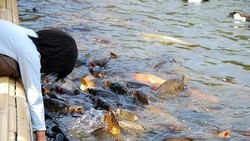
Sustainable Aquaculture
Editor/Mohamed Shihab
Aquaculture is projected to be the prime source of seafood by 2030, as demand grows from the global middle class and wild capture fisheries approach their maximum take. When practiced responsibly, fish farming can help provide livelihoods and feed a global population that will reach nine billion by 2050. But for an aquaculture system to be truly sustainable, it must have:
Environmental sustainability — Aquaculture should not create significant disruption to the ecosystem, or cause the loss of biodiversity or substantial pollution impact.
Economic sustainability — Aquaculture must be a viable business with good long-term prospects.
Social and community sustainability — Aquaculture must be socially responsible and contribute to community well-being.
Sustainable aquaculture is a dynamic concept and the sustainability of an aquaculture system will vary with species, location, societal norms and the state of knowledge and technology.
Several certification programs have made progress in defining key characteristics of sustainable aquaculture. Some essential practices include:
Environment practices: Mangrove and wetland conservation; effective effluent management and water quality control; sediment control and sludge management; soil and water conservation; efficient fishmeal and fish oil use; responsible sourcing of broodstock and juvenile fish; control of escapes and minimizing biodiversity and wildlife impact.
Community practices: Establish well-defined rights, aquaculture zones and responsibilities for aquaculturists; regulatory compliance and effective enforcement; community involvement; worker safety, fair labor practices and equitable compensation.
Sustainable business and farm management practices: Effective biosecurity and disease control systems; minimal antibiotic and pharmaceutical use; microbial sanitation; maintain global standards for hygiene; efficient and humane harvest and transport; accountable record-keeping and traceability; profitability.
The World Bank Group supports countries in their efforts to promote responsible and sustainable aquaculture. Current projects include work in Vietnam to improve management of coastal fisheries and supporting the development of responsible aquaculture in Ghana.
لمزيد من المعلومات يمكن التواصل مع الروابط التالية المتعلقة بالمزارع السمكية
https://www.facebook.com/groups/210540498958655/
http://kenanaonline.com/hatmheet
https://twitter.com/?lang=ar
http://www.youtube.com/results?search_query=shihabzoo&sm=3
https://www.facebook.com/%D9%88%D9%83%D8%A7%D9%84%D8%A9-%D8%A3%D9%86%D8%A8%D8%A7%D8%A1-%D8%A7%D9%84%D9%85%D8%B2%D8%A7%D8%B1%D8%B9-%D8%A7%D9%84%D8%B3%D9%85%D9%83%D9%8A%D8%A9-Aquaculture-Press-745767408789564/
E. mail: [email protected]


ساحة النقاش